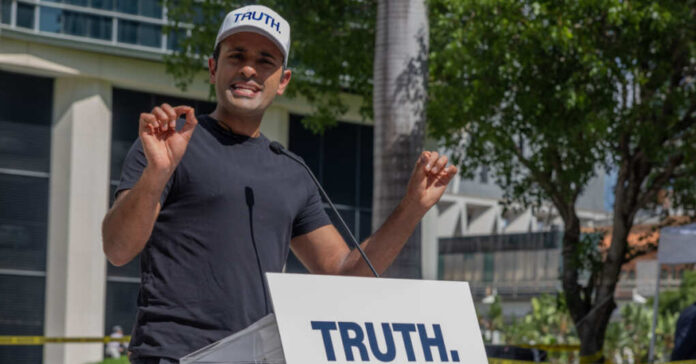
We have a lot of age requirements within the United States. 16 to drive, 18 to vote, 21 to drink, 35 to become president…it can be overwhelming to get it all figured out.
Vivek Ramaswamy, one of the leading GOP presidential candidates, recently announced that he’d move the age to vote up to 25 – and clearly, a number of people take issue with that.
Vivek Ramaswamy says the voting age should be raised to 25 instead of 18.
Do you agree? pic.twitter.com/RB6zirsAev
— Ian Jaeger (@IanJaeger29) November 20, 2023
While some people agree that it should be moved to at least 21, others bring in the argument of those in the military. If you’re old enough to die for your country, shouldn’t you be old enough to vote in the various elections?
If there was a caveat for military members, only those who are actively in the military would be able to vote at the age of 18. But if Ramaswamy got his way, they could potentially serve four years, leave the military at 22 – and then what? Would they still be given voting rights or would there suddenly be three years where they cannot vote?
The same would be for all of the 18 and 19-year-olds who are currently voting. If Ramaswamy suddenly became president, they would have the right that they’ve been enjoying revoked.
For many, 18 is seen as the age when you become an adult. It’s when you’ve graduated high school and can start your career. Many move out of their childhood homes and start living their own lives. They are responsible for their own decisions, for better or for worse.
Why 25? It’s the same age that the rental car companies have deemed to be acceptable. So, once you turn 25, you can finally rent a car…and vote?
25 is when many in the medical community have determined the brain to be more fully developed.
Ramaswamy doesn’t use any of those things as reasoning. He also admits that his staff hates the idea.
“There needs to be some civic experience you need to have gone through in order to actually vote. That experience could be living seven years as an adult and voting at age 25. That experience could be direct service to the country or some first responder service.”
What he fails to take into account is that some students take American history in high school, have the knowledge to pass a civics exam, and have even participated in student government or are members of political associations and clubs.
Ramaswamy has faced “vehement rejections” of his idea, especially as he’s taken his notions onto college campuses. He says that the only way that those under 25 could vote is by passing a civics exam.
Doesn’t that complicate the voting process?
Ramaswamy doesn’t believe it does. He believes it gives people more of an appreciation for being able to vote.
Of course, he’s also a hypocrite because his campaign has been focusing heavily on youth engagement and has spent a significant amount of time on college campuses. He wants those under 25 to vote for him. Then, once he’s in office, he plans on yanking those voting privileges away from them unless they can pass an exam or show some kind of civic experience.
He’d have to win the GOP nomination first, and that’s about as unlikely as a vote to increase the voting age to 25.
The voting age is likely to stay right where it is at 18.











